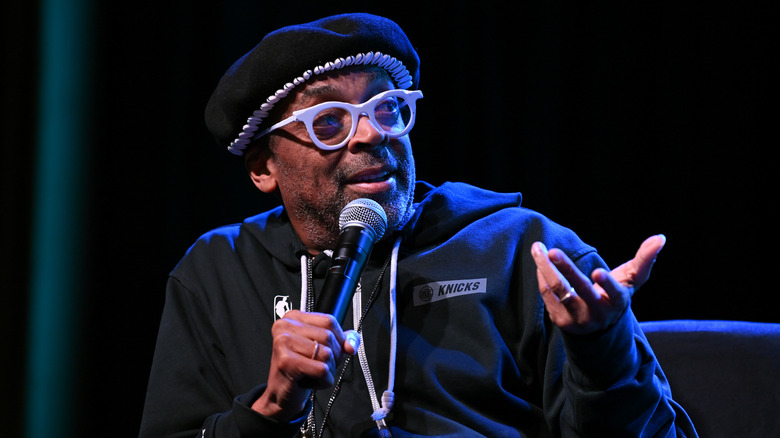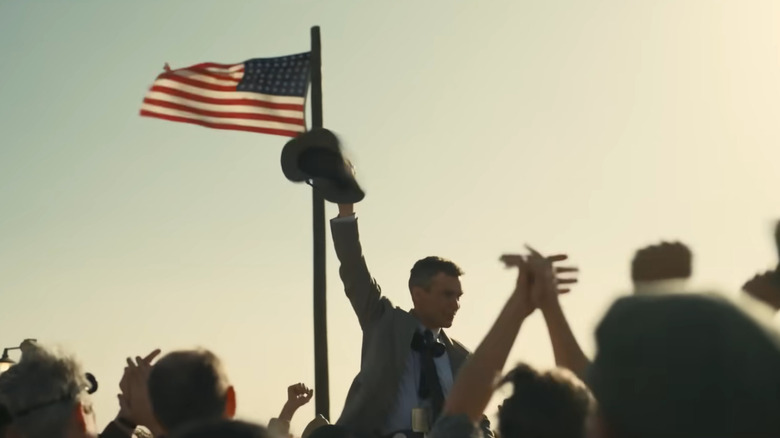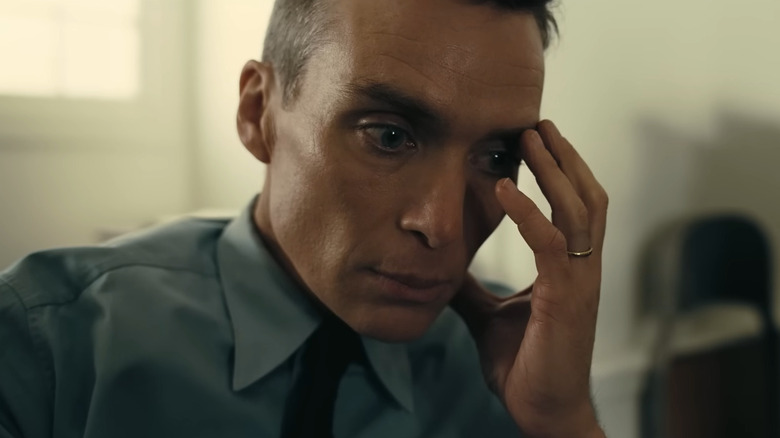Spike Lee Loved Oppenheimer, But He Has One Major Complaint
Christopher Nolan had massive expectations to fulfill leading to the release of his latest epic, "Oppenheimer." Thankfully, his efforts paid off when the film, which chronicles the true story of physicist and "father of the atomic bomb" J. Robert Oppenheimer, opened to critical acclaim and an $80.5 million opening weekend, the best of any Nolan release outside of "The Dark Knight" and "The Dark Knight Rises." Fellow filmmaker Spike Lee is among the movie's fans but felt that one major ingredient was missing that would have made for a more well-rounded experience.
In an interview with The Washington Post surrounding his recent exhibit at the Brooklyn Museum, the "Do the Right Thing" and "BlacKkKlansman" director was asked about any recent movies that he's enjoyed. Along with discussing Martin Scorsese's upcoming "Killers of the Flower Moon," Lee also made mention of Nolan's most recent work, saying, "And Chris Nolan with 'Oppenheimer,' you know, he's a massive filmmaker. Great film."
While he largely enjoyed "Oppenheimer," the Oscar winner noted an addition he would've made to fully detail the true story. "I would like to add some more minutes about what happened to the Japanese people," Lee stated. "People got vaporized. Many years later, people are radioactive. It's not like he didn't have power. He tells studios what to do. I would have loved to have the end of the film maybe show what it did, dropping those two nuclear bombs on Japan." Lee's critique may have come from a place of love, but he nevertheless makes a compelling point — one that has caused debate among other viewers as well.
The film's lack of Japanese perspective has split viewers
Spike Lee isn't the only one who's questioned the omission of Japan in "Oppenheimer." Viewers have weighed in on the matter, with many seeing the absence of such a perspective as either a detriment to or a strength of the movie. Greg Mitchell of Mother Jones argued that without presenting any solid counterargument to America's decision, the film loses a lot of its potential bite. "Nolan's message is undermined by his failure to challenge America's use of the bomb, beyond trying to make sense of Oppenheimer's wildly conflicting emotions," Mitchell wrote.
Others weren't so shocked by the prioritizing of white American voices but were nevertheless tired of the trope showing up in another Hollywood blockbuster. Mediaversity Reviews founder and film critic Li Lai shared on Twitter, "I was uncomfy watching yet another movie about tortured white male genius when the victims of the atrocities glossed over by the script—Japanese people, interned Japanese Americans, and Native Americans—had no voice."
Speaking with KQED, Karen Umemoto, the director of Asian American Studies at the University of California Los Angeles, similarly criticized the erasure. "I would show depictions of the bombings that are raw and honest," Umemoto said. "But that's not what sells movie tickets."
Some fans didn't see how showcasing this perspective would have organically fit into the film, with u/Twj247 on Reddit noting, "It was simply not witnessed by Oppenheimer or Strauss."
Furthermore, Redditor u/lxsadnax felt that presenting the atrocity could lead to backlash. "It's a story about Oppenheimer and the nuclear bomb ..." they shared. "If they showed the bombs dropping people would've accused them of turning it into a special effects extravaganza." While this is a valid concern, ignoring Japan's point of view could have greater repercussions.
Nolan's focus on Oppenheimer has potentially damaging consequences
For a movie with a three-hour runtime, it's surprising that "Oppenheimer" never showcases the key event that brings the titular scientist such gut-wrenching torment. When discussing his choice to leave this part out of the story, Christopher Nolan shared with MSNBC that he wanted his story to focus primarily on J. Robert Oppenheimer himself, adding, "He learned about the bombings of Hiroshima and Nagasaki on the radio — the same as the rest of the world ... Everything is his experience, or my interpretation of his experience, because as I keep reminding everyone, it's not a documentary. It is an interpretation. That's my job."
Some have agreed with the sentiment, believing that a white director is not fit to properly depict the true struggles and experiences of Japanese people from this time. However, others have argued against this point. Given the massive audience that Nolan's films typically attract, "Oppenheimer" presented a rare opportunity to bring unflinching, mainstream attention to the tragedy that befell the hundreds of thousands of Japanese citizens who died or were left suffering from the effects of the American-made superweapon.
By centering the film on an entirely American perspective, Nolan and company passed up this valuable opportunity. Stan Shikum, co-president of the Seattle Chapter of the Japanese American Citizens League, noted the negative consequences this absence could have, telling NBC News, "That lack of more of a global perspective allows atrocities to continue to happen because we still dehumanize other people that we don't know."


